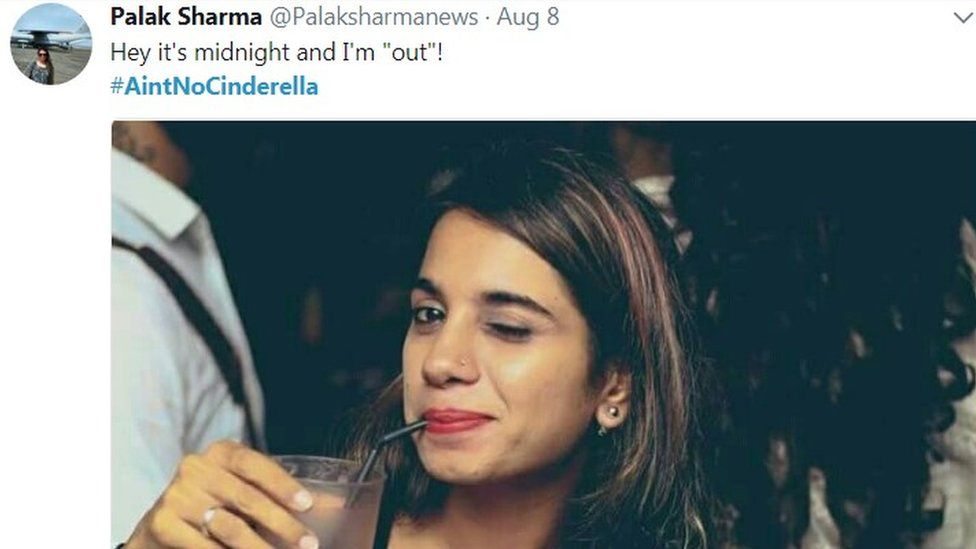#AintNoCinderella: Why Indian women are posting midnight photos
- Published

Women in India have been posting photographs of themselves enjoying a night out on social media in response to a politician who said a woman who was chased in her car by two men "should not have gone out so late at night".
Varnika Kundu, who works as a DJ in the northern city of Chandigarh, was returning home on Friday night when she was allegedly chased by the men, one of whom was Vikas Barala, the son of a prominent politician from India's governing Bharatiya Janata Party (BJP).
On Wednesday, Mr Barala was arrested - police say he stands accused of "stalking, drink-driving and attempt to kidnap".
Ms Kundu said she was "chased and almost kidnapped" and that she was "not lying raped and murdered in a ditch somewhere" only because police quickly responded to her distress call and rescued her.
After she wrote a Facebook post about her ordeal which went viral, senior BJP politician in Haryana state Ramveer Bhatti blamed Ms Kundu for what happened to her.
"The girl should not have gone out at 12 in the night," he told the CNN-News18 television channel. "Why was she driving so late in the night? The atmosphere is not right. We need to take care of ourselves."
Mr Bhatti then went on to tell The Times of India that "parents must take care of their children. They shouldn't allow them to roam at night. Children should come home on time, why stay out at night?"
This "victim shaming" didn't go down well, and soon women began posting photos of themselves out at night under the hashtag #AintNoCinderella.
The campaign was launched by Divya Spandana, head of the opposition Congress party's social media cell who is a popular film actress from the southern state of Karnataka and often goes by her screen name Ramya.
"Why shouldn't women go out after midnight? I'm asking people like Mr Bhatti who are they to set curfew hours for us? I want to ask him who is he to question us? This is such a regressive mindset," Ms Spandana told the BBC.
She started out by sending a message to some women on her WhatsApp group on Monday evening.
"Ladies, how often have you heard something regressive like this from the mouth of a 'leader' who doesn't know much better? I'll answer: too often," the message said.
"This time they're telling us when we can and cannot go out of the our houses. This has to STOP" she added.
Then, she posted an image of herself on Twitter and invited other women to do the same.
The campaign soon caught on and hundreds of women have since posted photographs on Facebook, Twitter and Instagram challenging patriarchal mindsets that always blame women.
Among the first to post a midnight selfie was Sharmistha Mukherjee, Congress party leader and daughter of former Indian president Pranab Mukherjee:
Many others followed up, often with defiant messages:
When journalist Palak Sharma posted her image, sipping a drink and winking at the camera, she got loads of messages appreciating her "bold stand":
"But in the last two days, I've received lots of threats too. I've been called a whore, a slut," she told the BBC.
"Think about it - I'm a journalist, I work for the government-run media, I'm no pushover and I'm being threatened for my tweet," she said.
"But I'm not afraid," Ms Sharma added. "Nothing is going to stop us, no amount of naysayers can frighten us. We aren't Cinderellas, we don't have to be home at midnight."
With more and more women joining the campaign, it seems many others are refusing to be intimidated too.